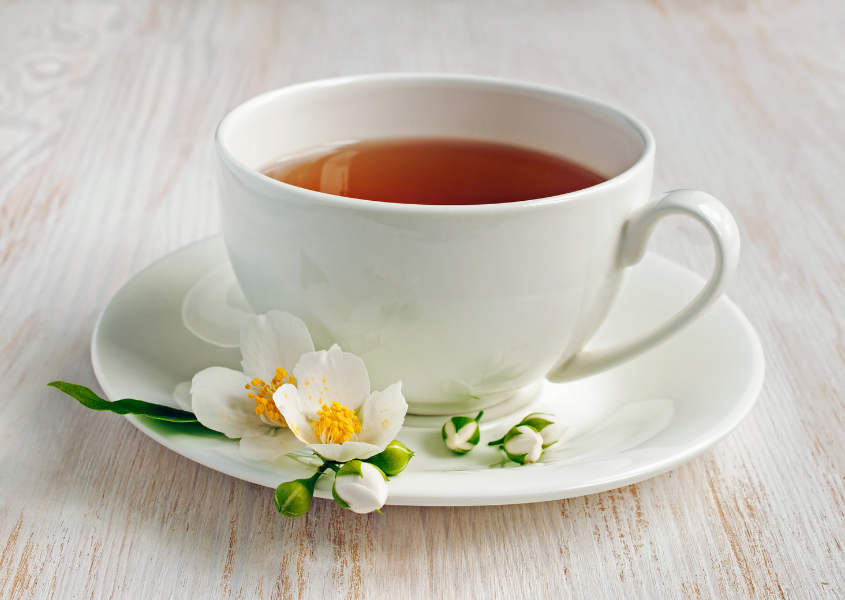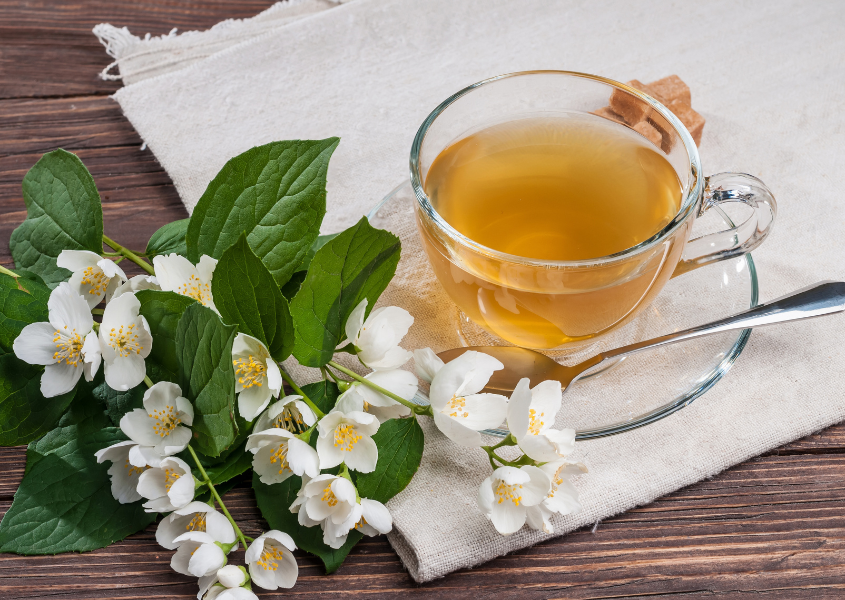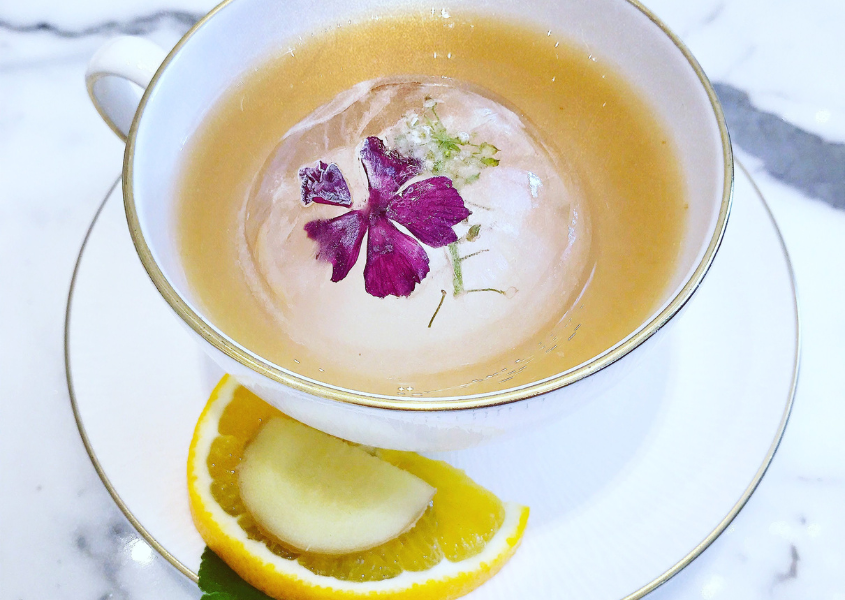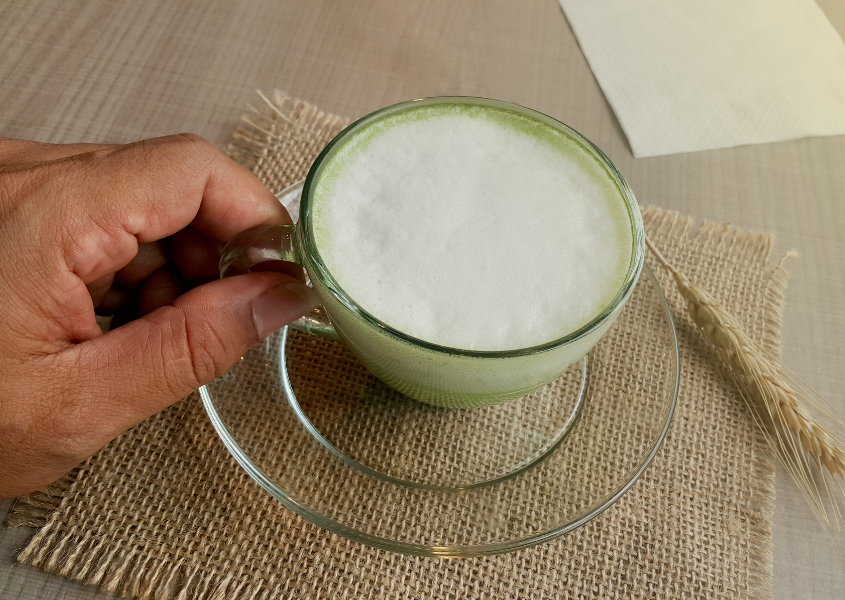


Jasmine tea is a lightly scented beverage that combines the delicate aroma of fresh jasmine flowers and the flavor of tea leaves. Originating from China, it is one of the most famous scented teas available. It is typically made with green tea as a base. However, black tea and white tea are also sometimes used.
With its numerous health benefits, it is more than just a lovely drink to have. In this article, you will discover reasons why you should be drinking it! You will also discover a few delicious and healthy recipes, including jasmine tea, to try.
History of Jasmine Tea

The Jasmine plant was first introduced into China during the Han Dynasty (206 BC to 220 AD). It was only around the fifth century when it was used to scent tea. As it grew in popularity within the country, it also became widespread in the West around the Qing Dynasty period (1644 to 1912 AD) [1].
Types of Jasmine Tea
Jasmine tea can come in various forms, offering a unique experience for those who love drinking tea.
The most traditional type is jasmine green tea, where green tea leaves are combined with fresh jasmine blossoms. This gives the tea a sweet aroma while preserving the floral flavors of jasmine.
Loose Leaf vs. Jasmine Tea Bags
Loose leaf is a form of tea that is made up of whole, unbroken leaves. Instead of brewing it to get your tea, you have to steep and allow it to infuse with water. As the water flows through, it will extract all the good vitamins, minerals, aroma, and flavor.
On the other hand, jasmine tea bags uses low-grade tea leaves which come in the form of broken leaves. Most times, tea bags would have lost their flavor and aroma. So, the best option would definitely be high-quality loose-leaf tea!
Jasmine Tea Benefits
Aside from that, you must be wondering why you should drink jasmine tea. What kind of benefits could it possibly have?
Well, here are reasons why you should consider consuming it.
1. It is rich in antioxidants
One of the biggest benefits of jasmine tea is that it is filled with antioxidants, especially polyphenols and catechin. Antioxidants is great for the body as it help with inflammation, support healthy cholesterol levels, and protect the skin, heart, and brain against free radical damage.
2. Aids in weight loss
The catechins in the tea can help to speed up metabolism and increase fat burning. This makes it a good supplement for your weight loss journey.
See also:
7-Day Weight Loss Low-Carb Diet To Achieve Your Dream Body
3. Supports heart health
According to studies, tea flavonoids offer potential benefits to cardiovascular health. Its high antioxidant properties also help to support heart health. The catechin in the tea helps to reduce inflammation and prevent damage to the cells. This lowers the risk of heart disease by protecting the blood vessels and tissues.
The antioxidants also help with lowering bad cholesterol (LDL) levels. Lower LDL levels mean a reduced risk of plaque formation in the arteries which can lead to heart disease.
See also:
7-Day Low Cholesterol Diet Plan That Is Simple and Nutritious
4. Helps with digestion
It can also aid in digestion by helping to break down fats and proteins, making it a great choice after eating a heavy meal or after mealtimes generally.
5. Boosts your immune system
The antioxidants in the tea can help to boost your immune system by fighting off bacteria and infections. It also contains anti-inflammatory properties which help to prevent damage to your body.
6. Protect against cancers
Did you know that jasmine tea is known as a cancer-fighting food?
The polyphenol content in the tea has been demonstrated to be effective in the prevention against the following cancers:
- Skin
- Lung
- Liver
- Colon
- Bladder
Apart from these, there are also other types of cancers that jasmine tea can protect against, seen in this study.
7. Supports brain health
Last but not least, it helps to support brain health. Thanks to the antioxidant properties once again, it protects brain cells from oxidative stress and reduce the risk of neurodegenerative diseases.
The different compounds in jasmine tea play a role in regulating neurotransmitters such as dopamine and serotonin, improving mental clarity and function. At the same time, the mild caffeine content helps to enhance focus and alertness. Regularly consuming jasmine tea will lead to much better and improved overall brain health.
Tips for Brewing
When it comes to brewing your jasmine tea, you want to make sure that you are using high-quality ingredients and steeping correctly for a high-quality taste.
Here are some tips for brewing your cup of tea:
- Choose high-quality tea: You should opt for loose leaf as it provides a richer flavor compared to tea bags. Also, ensure that they are fresh leaves.
- Use proper temperature: The right temperature for your tea should be between 80 to 85ºC or 175-185°F. This is to ensure that your tea won’t have a bitter taste.
- Ensure adequate steeping time: Ensure that you are steeping the tea leaves for a maximum of 2-3 minutes each time.
Additional Recipes To Try
If you are curious to try drinking it but are unsure of what to make, below are some recipes that you can try. These are the more common ways that people tend to drink.
1. Classic Jasmine Tea

Ingredients:
- 1 teaspoon loose-leaf jasmine tea or 1 jasmine tea bag
- 1 cup of hot water
Instructions:
- Boil some water and let it cool slightly to about 80 to 85ºC (175-185°F).
- Place the tea leaves or tea bag in a teapot or cup.
- Pour hot water over the tea and let it steep for 2-3 minutes.
- Remove the tea leaves or tea bag.
- Sweeten with honey or sugar if desired. Enjoy!
2. Iced Jasmine Tea with Lemon

Ingredients:
- 1 teaspoon loose-leaf jasmine tea or 1 jasmine tea bag
- 1/2 cup of hot water
- 1/2 cup of cold water
- 1-2 lemon slices
- honey or sugar (optional)
- Ice cubes
Instructions:
- Boil some water and let it cool slightly to about 80 to 85ºC (175-185°F).
- Steep the jasmine tea in hot water for 2-3 minutes.
- Remove the tea leaves or tea bag.
- Pour your tea into a glass until it is about halfway full. Then if you want, add in any sweetener of your choice.
- Fill the remaining glass with cold water and add in your lemon slices.
- Add in some ice cubes. Serve and enjoy!
3. Jasmine Tea Latte

Ingredients:
- 1 teaspoon loose-leaf jasmine tea or 1 jasmine tea bag
- 1 cup of hot water
- 1/2 cup milk (choose between dairy or non-dairy)
- 1-2 teaspoons honey or sugar (optional)
- Cinnamon (optional)
Instructions:
- Boil some water and let it cool slightly to about 80 to 85ºC (175-185°F).
- Steep the jasmine tea in hot water for 2-3 minutes.
- Remove the tea leaves or tea bag.
- Heat up your cup of milk but ensure that it is not boiling. You may also choose to froth your milk with a whisk or milk frother.
- Pour milk into a glass then pouring in your tea.
- You may choose to sweeten your latte with honey or sugar or sprinkle some spices like ground cinnamon as a finishing touch. Serve and enjoy!
Conclusion
Thus, with all of this newfound knowledge, hopefully, it will convince you to start including this wonderful beverage into your diet. With a multitude of health benefits, let it help you kickstart your journey to a healthier you!
For more related content:
15 Delicious Low-Carb Breakfast Ideas to Try
The No-Sugar Diet: What Is It and Is It Safe?
What is jasmine tea good for?
Does Jasmine tea have high caffeine?
Does jasmine tea make you sleepy?
Is jasmine tea better than green tea?
Chung, M., Zhao, N., Wang, D., Shams-White, M., Karlsen, M., Cassidy, A., Ferruzzi, M., Jacques, P. F., Johnson, E. J., & Wallace, T. C. (2020). Dose-Response Relation between Tea Consumption and Risk of Cardiovascular Disease and All-Cause Mortality: A Systematic Review and Meta-Analysis of Population-Based Studies. Advances in nutrition (Bethesda, Md.), 11(4), 790–814. https://doi.org/10.1093/advances/nmaa010
Jing Tea (2021) A Guide to Jasmine Tea [online].
Yang, C. S., Ju, J., Lu, G., Xiao, H., Hao, X., Sang, S., & Lambert, J. D. (2008). Cancer prevention by tea and tea polyphenols. Asia Pacific journal of clinical nutrition, 17 Suppl 1(Suppl 1), 245–248.





